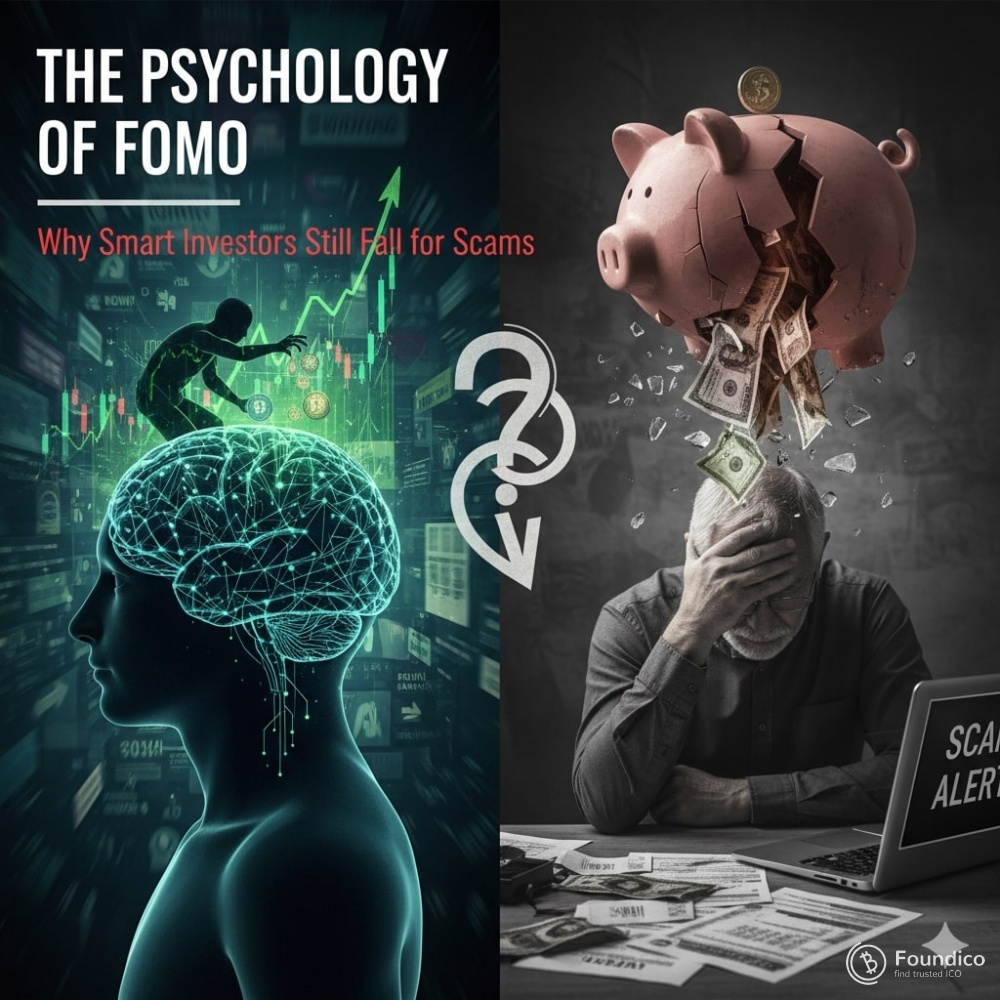The Psychology of FOMO: Why Smart Investors Still Fall for Scams

By Dr. Pooyan Ghamari, Swiss Economist and Visionary
The market is a mirror: it shows you exactly what you want to see—until it cracks. In that fracture, fortunes vanish, reputations shatter, and even the most disciplined minds discover they were never immune. They were just human. FOMO—fear of missing out—isn’t a buzzword for teenagers chasing concert tickets. It’s a precision weapon, aimed at the ambitious, the brilliant, the successful. And it rarely misses.
The Dopamine Trap: When Your Brain Betrays Your Balance Sheet
Your prefrontal cortex runs the numbers. Your limbic system runs the show.
A message pings: “Seed round closes in 3 hours. 100x potential.” The spreadsheet says risk. The pulse says now.
This isn’t weakness—it’s wiring. The same neural pathway that once urged your ancestors to chase the last mammoth now chases yield. Scammers don’t need to outsmart you. They just need to out-feel you. One perfectly timed graph, one whispered “insider” name, and the rational investor becomes a bidder in an auction of illusions.
The Elite Illusion: Why the Smarter You Are, the Harder You Fall
Intelligence is a magnifying glass. It enlargifies both insight and blind spots.
High-IQ investors don’t fall for obvious frauds. They fall for elegant ones. The white paper with 47 pages of math. The founder who quotes Taleb and speaks fluent macro. The tokenomics that “solve” DeFi’s trilemma. These aren’t scams—they’re seductions. And seduction works best on those who believe they’re above it.
I’ve sat in Zurich boardrooms where PhDs debated yield curves while wiring six figures to a “Web3 infrastructure play” run by a 23-year-old with a hoodie and a Harvard rejection letter. The room smelled of espresso and overconfidence.
The Whisper Network: Where Exclusivity Becomes Entrapment
“Only 12 spots left.” “Not on the cap table? You’re not serious.” “This isn’t for retail.”
Exclusivity is FOMO’s couture label. It transforms greed into privilege. Suddenly, due diligence feels like gatecrashing. Asking for audited financials? That’s what normies do.
The psychology is ancient: tribes rewarded those who secured rare resources. Today’s rare resource isn’t food—it’s alpha. And the tribe isn’t your village. It’s your Signal group, your Discord, your “mastermind” with a $50K buy-in.
The Momentum Mirage: When Price Action Poses as Proof
A chart goes parabolic. A Telegram channel erupts: “Told you at $0.03.” Your inbox: “Still time to ape.”
Price becomes prophecy. Never mind the unlocked tokens, the anonymous team, the smart contract with a backdoor the size of a barn. Momentum feels like validation. And feelings, in the heat of a pump, outrank forensics.
This is where quant legends become bagholders. The same mind that models Black-Scholes now models narratives. “If it’s up 400%, there must be something.” There is. It’s called a rug.
The Silence After the Storm: When Regret Writes the Real White Paper
The wallet drains. The Telegram goes dark. The founder’s Twitter? Deleted.
Now the autopsy begins. But here’s the cruelest part: the victim often blames themselves for not acting faster. “If I’d just bought at $0.05…” The scam doesn’t just take your money. It colonizes your self-narrative.
I’ve seen grown CEOs stare at empty MetaMasks and whisper, “I should’ve known.” No. You were designed not to.
The Antidote: Building a Mind Immune to Manipulation
- Institutionalize Doubt Mandate a 72-hour hold on any “urgent” deal. Scarcity collapses under time.
- Outsource Your FOMO Hire a devil’s advocate whose bonus depends on killing bad ideas.
- Track Your Triggers Keep a “FOMO journal.” Every time you feel the itch, write: What am I afraid of missing? What’s the worst-case? Patterns emerge. So does clarity.
- Bet on Boring The best returns often come from assets so dull they don’t trigger dopamine. Swiss bonds. Sewer utilities. Tobacco stocks. Wealth is built in the shadows, not the spotlight.
- Celebrate the Miss Every scam you dodge is a silent victory. Toast the ones that got away.
The Final Edge: Turn FOMO into FOGO
Fear of Getting Owned.
The market will always dangle carrots. Your job isn’t to outrun the crowd—it’s to out-think the trap. The next unicorn might be real. But 99 times out of 100, it’s a donkey with a party hat.
Invest like the scam is already in your portfolio. Because sometimes, the only way to win is to refuse to play.
Dr. Pooyan Ghamari is a Swiss economist and visionary who advises ultra-high-net-worth families on behavioral risk in frontier markets. He has never lost money to a meme coin. Yet.
